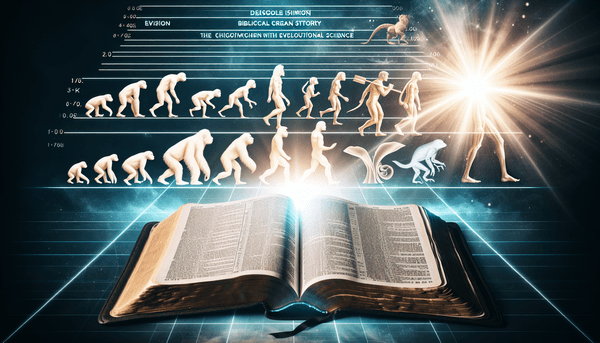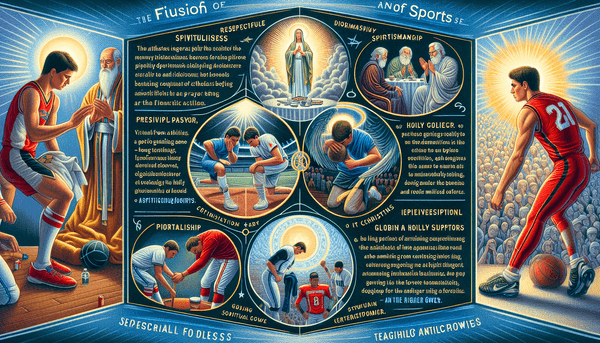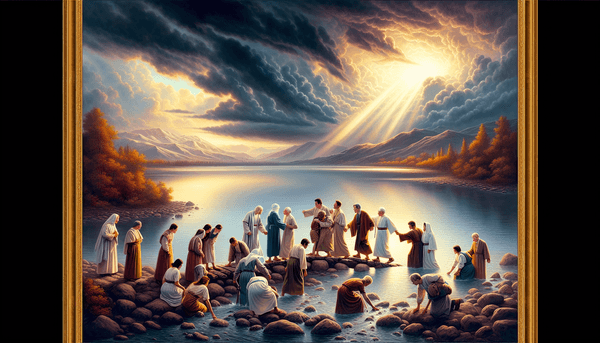Theistic Evolution
Theistic Evolution presents a view where the divine orchestration of life is harmoniously intertwined with the natural process of evolution. Proponents of this perspective argue that God utilized evolution as a tool to craft the diversity of life, including the intricate designs that scientists uncover. This idea finds comfort in verses like Colossians 1:16-17, which affirm that all things were created through and for Christ, and Hebrews 11:3, which speaks of the worlds being framed by the word of God. Such scriptures support the belief that the mechanisms of evolution could operate under the sovereignty of a Creator, without diminishing the divine nature of the act of creation itself.
Framework Theory
The Framework Theory takes a non-literal approach to the days of creation described in Genesis, suggesting that these days serve as a symbolic framework to convey the purpose and wisdom of God's creative work. This interpretation sees the biblical creation story not as a scientific account but as a poetic narrative that highlights God's order and intentionality. The poetic structure of Genesis 1 and the assertion in 2 Peter 3:8 that 'a day is like a thousand years' to the Lord, encourage a reading of the creation account that emphasizes theological truths over chronological specifics.
Day-Age Theory
The Day-Age Theory offers a unique reconciliation by positing that the 'days' of creation in Genesis correspond to lengthy epochs of Earth's history. This view allows for a gradual development of life in a manner consistent with the fossil record, while still affirming the active role of God in the creative process. It leans on verses such as Psalm 90:4, which likens a thousand years to a day in God's sight, suggesting that the six days of creation found in Genesis 1:5-31 could be metaphorical, representing extended periods of time. Similarly, the lives of Biblical characters provide insights into navigating the complexities of faithful living over time.
Progressive Creationism
Progressive Creationism acknowledges the scientific evidence for an old Earth and accepts some aspects of evolution, but it posits that God intervened supernaturally at key points in natural history. This perspective accepts the idea of an evolving creation but emphasizes that God's miraculous input was necessary at various stages, particularly in the creation of humans, as described in Genesis 2:7. Progressive creationists often point to Acts 17:26, which speaks of God determining preappointed times and the boundaries of human habitation, as indicative of a God who is intimately involved in the development of life on Earth.
Biblical Creation and Human Origins
The Book of Genesis portrays humans as uniquely created in God's image, a concept that holds immense theological value. The narrative emphasizes the special status of humans in creation, crafted from the dust of the ground and animated with the breath of life (Genesis 2:7). While the Bible does not detail the process by which God created life and does not mention evolution as it is understood by science, it insists on the centrality of humans in God's creation. For many believers, this divine image is a cornerstone of faith that affirms human dignity and purpose, as echoed in Psalm 8:3-6.
FAQ
Q: How can believers reconcile the theory of evolution with the biblical story of creation?
A: Believers can approach the reconciliation of evolution with the biblical creation story through various frameworks, such as theistic evolution, which sees God using evolution as a creative tool, or the Day-Age Theory, which aligns the 'days' of creation with long geological epochs. The Framework Theory interprets the creation days symbolically, while Progressive Creationism accepts scientific data but emphasizes divine intervention at certain stages.
Q: What does the Bible say about masturbation?
A: The Bible does not explicitly mention masturbation, and interpretations of its moral implications vary among theologians and religious communities. Some consider it a sin based on broader biblical principles related to sexual conduct, while others see it as a matter of personal conscience.
Q: What does the Book of Genesis say about creation?
A: In the Book of Genesis, the creation account depicts God creating the universe, Earth, and all life forms in six days, with humans being created on the sixth day in God's image. The Bible does not provide a detailed explanation of how life was created and does not mention the process of evolution. Instead, it focuses on the fact that God is the creator of all things.
Q: Is it possible to explain evolution with the Bible?
A: While the Bible does not directly address the scientific theory of evolution, some Christians interpret the creation story metaphorically and see no conflict between scripture and the theory of evolution. They suggest that the Bible's emphasis is on the who of creation (God) rather than the how, leaving room for scientific explanations of the development of life.





